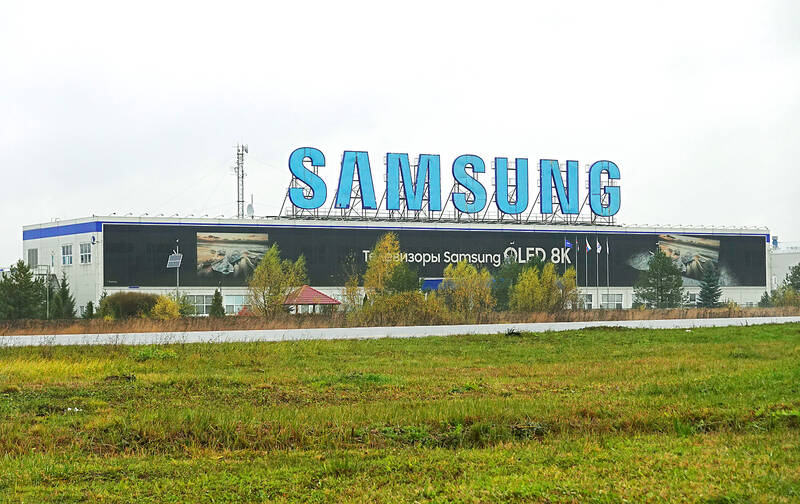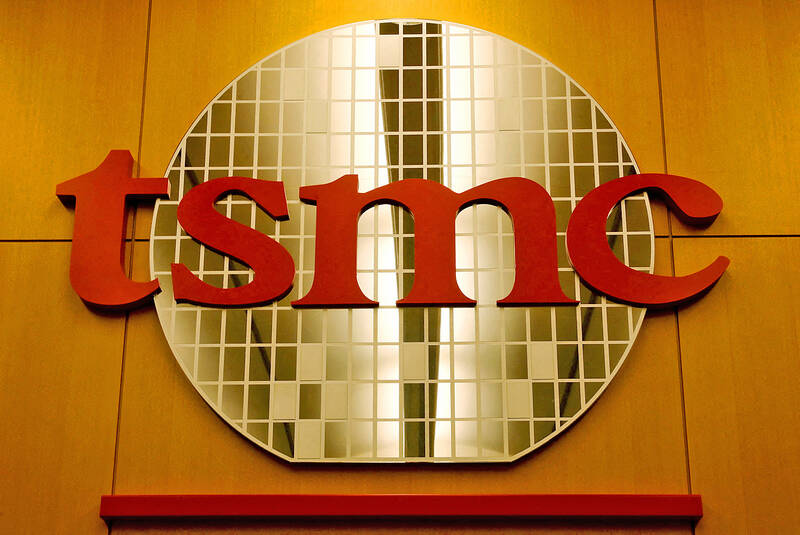Taiwan and South Korea, two of Asia’s most tech-heavy economies, are facing an uphill battle in trying to stem losses in some of the world’s worst-performing assets this year.
The two countries are hit particularly hard by a global growth slowdown and US chip restrictions.
Authorities are stepping up actions, including introducing curbs on short selling, readying market stabilization funds to buy assets and intervening in currency markets in moves reminiscent of the early days of the COVID-19 pandemic.

Photo: EPA-EFE
While markets everywhere have seen gut-wrenching moves in reaction to accelerating inflation, aggressive central bank rate hikes and a soaring US dollar, Taiwan and South Korea look especially vulnerable among major economies. Both are highly dependent on exports for growth, and are swayed by global demand for chips. Adding to their woes is the impact of new US curbs on supply chains linked to China’s semiconductor industry.
The interventions have not stopped the declines. Taiwan’s equity benchmark has dropped about 8 percent since a support fund was activated in July, and South Korean shares were down 11 percent in the past two months, leaving stock gauges in the two markets more than 25 percent lower this year.
The New Taiwan dollar and the won are also among the biggest losers in the world against the greenback this year to date.

Photo: Tyrone Siu, Reuters
“These stabilization measures are intended to buy enough time until the tech cycle bottoms out and foreign investors return,” Modular Asset Management Pte Ltd strategist Wai Ho Leong (梁偉豪) said. “Turning markets around is a different matter.”
In Taipei, the central bank last week warned of “severe economic challenges” for next year, while South Korea recorded its longest string of trade deficits since the 1997-1998 Asian financial crisis.
Amid these headwinds, analysts have cut their earnings estimates for South Korea’s SK Hynix Inc and Samsung Electronics Co to the lowest in more than two years.
While the chipmakers have won approval from the US to keep ordering US equipment for their plants in China for one year, concerns swirl around their business models as the US seeks to curb China’s self sufficiency and advancement in military capabilities.
A recessionary environment in the West and China’s “zero COVID-19” policy are also having knock-on effects.
South Korea’s chief economic policymakers, including the central bank governor and finance minister, were to meet yesterday to look into ways to calm the local credit market, the South Korean central bank said in a text message late on Saturday.
The meeting scheduled at about midday was the highest-level policy discussion since yields surged to decade-highs and default risks spread, prompting authorities to revive a 1.6 trillion won (US$1.1 billion) bond stabilization fund earlier this month.
“In the near term we remain cautious on Asian stocks, in particular on stocks or equity markets that are exposed to external growth, such as Korea,” and tech hardware firms, Nomura Holdings Inc strategists including Chetan Seth wrote in a recent note.
Taiwan Semiconductor Manufacturing Co (台積電) and Samsung account for the biggest weights on the TAIEX and South Korea’s KOSPI respectively.
Taiwan and South Korea are not alone in supporting markets.
Japan has intervened in the currency market to stem the yen’s decline, but it failed to prevent the currency’s plunge to a 32-year low. China is easing restrictions on mutual funds’ purchases to back its plunging stock market.
To be sure, slumping valuations in Taiwan and South Korea are proving attractive for some, and could spark short-term relief rallies.
Foreign investors snapped up South Korean shares for 13 straight days this month, and Morgan Stanley is among the outliers calling an end to the underperformance of Asian technology stocks as it sees most risks as priced in.
Others remain skeptical that the export-reliant economies would pick up anytime soon, and some favor Asian markets that are backed by strong domestic demand and a revival in tourism, such as India and Indonesia.
“It’s going to be a long winter and these support measures will probably not be enough,” said Ken Peng (彭墾), head of Asia investment strategy at Citigroup Inc’s private banking arm, referring to actions from Taiwanese and South Korean authorities. “A recovery will likely have to wait until the USD peaks and rolls over, likely when non-US growth is expected to recover.”

The US dollar was trading at NT$29.7 at 10am today on the Taipei Foreign Exchange, as the New Taiwan dollar gained NT$1.364 from the previous close last week. The NT dollar continued to rise today, after surging 3.07 percent on Friday. After opening at NT$30.91, the NT dollar gained more than NT$1 in just 15 minutes, briefly passing the NT$30 mark. Before the US Department of the Treasury's semi-annual currency report came out, expectations that the NT dollar would keep rising were already building. The NT dollar on Friday closed at NT$31.064, up by NT$0.953 — a 3.07 percent single-day gain. Today,

‘SHORT TERM’: The local currency would likely remain strong in the near term, driven by anticipated US trade pressure, capital inflows and expectations of a US Fed rate cut The US dollar is expected to fall below NT$30 in the near term, as traders anticipate increased pressure from Washington for Taiwan to allow the New Taiwan dollar to appreciate, Cathay United Bank (國泰世華銀行) chief economist Lin Chi-chao (林啟超) said. Following a sharp drop in the greenback against the NT dollar on Friday, Lin told the Central News Agency that the local currency is likely to remain strong in the short term, driven in part by market psychology surrounding anticipated US policy pressure. On Friday, the US dollar fell NT$0.953, or 3.07 percent, closing at NT$31.064 — its lowest level since Jan.

The New Taiwan dollar and Taiwanese stocks surged on signs that trade tensions between the world’s top two economies might start easing and as US tech earnings boosted the outlook of the nation’s semiconductor exports. The NT dollar strengthened as much as 3.8 percent versus the US dollar to 30.815, the biggest intraday gain since January 2011, closing at NT$31.064. The benchmark TAIEX jumped 2.73 percent to outperform the region’s equity gauges. Outlook for global trade improved after China said it is assessing possible trade talks with the US, providing a boost for the nation’s currency and shares. As the NT dollar

The Financial Supervisory Commission (FSC) yesterday met with some of the nation’s largest insurance companies as a skyrocketing New Taiwan dollar piles pressure on their hundreds of billions of dollars in US bond investments. The commission has asked some life insurance firms, among the biggest Asian holders of US debt, to discuss how the rapidly strengthening NT dollar has impacted their operations, people familiar with the matter said. The meeting took place as the NT dollar jumped as much as 5 percent yesterday, its biggest intraday gain in more than three decades. The local currency surged as exporters rushed to